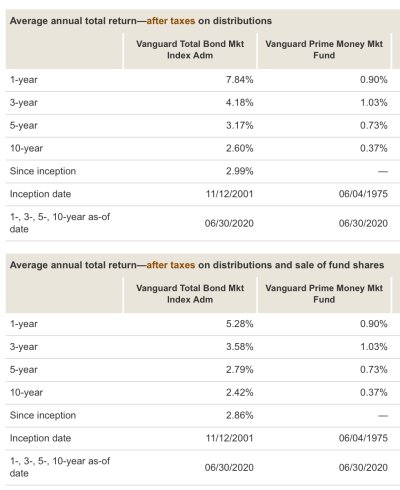Why "NO" Bond Funds
Ditto previous post (former Institutional trader/market-maker here)
Individual bonds - latter-ed out thru time, ie multiple maturity years - is only way to use bonds effectively. Bond funds are a product of bundled for herd mentality and hugely ineffective when rates rise. Couple of issues of concern.
Interest rates have typically run in cycles (trends) of 30 to 32 yrs. Last uptrend ended in late 70's. Downtrend was set for reversal around 2010 -- been artificially suppressed since then. Short Take - we're way overdue for an uptrend to engage (ie 30+ yrs of up ticks) So, historically rates will most likely return to the 7-10% short term maturities within next 15 +/- years. Most people vitally alive today don't have an idea of what a continued rising rate environment will do to Bonds Funds - mainly because "funds" didn't exist on mass scale during the last up cycle. (didn't become Vogue until early/mid 80's)
Previous poster used a short term duration - 6.4 yrs - consistent with the old rule of thumb of 10 yr maturities with 1% rate increase correlates to a 8% drop in NAV. (Net Assett Value ie. share value of a bond fund) Hence, with short terms, for every 1% rise in rates - you lose 8% NAV - value in your holdings. Mid term - Long term bonds (15 - 30 yrs) go down 12% to 18% NAV for every 1%. So you might get a higher yield(income) but you can't sell the equity for your acquisition price-you have to take a substantial discount (loss) to rotate the equity for better yield quality. Or, you have to collect that higher yeild for 6-8 years to offset your value lose. (assuming no other rate hikes) Yea....They try to counter with new products like "Float Rate Funds" - not worth it, still at interest rate risk and other consequences (another time maybe) Like a see-saw yields and pricing are inversely related.
(ok, so those are "knowns" or givens!) What you may not know......human element.
Fund manager's job depends on yield/return. (to keep their job they have to put out highest yield) To be competitive they have to deliver new rates/yield. So when rates go up they cannot "not' react thus, they must sell old lower yield paper (bonds) at a discount in order to buy new paper (higher yields) at par or premium value - to stem off redemption orders (customers selling bond fund shares chasing higher yields elsewhere) because customers can find new offerings with a higher yield as soon as Fed's raise rates (that's new paper)
So, in essence, bonds funds have no maturity dates, only NAV - they are perpetual time wise. As opposed to individual bonds that have a finite maturity date - with a know value tied to stated yield per issue.
Hope this helps - I saw the question, strike'd a mood and felt like writing!
P.S. Google latter'd Bonds, time duration's, A paper.
BTW there is little to virtually no comp for a retail broker/advisor (common big brand brokerage houses) to reap on buying individual bonds. So, they have no incentive to use them - well, that is until they convince you to let them wrap a fee around the value. Not a fiduciary move at all, but no one out's it. (really another story) anyway good luck and stay away from bond funds, don't care if its free - you lose precious value in an uptick of rates.

